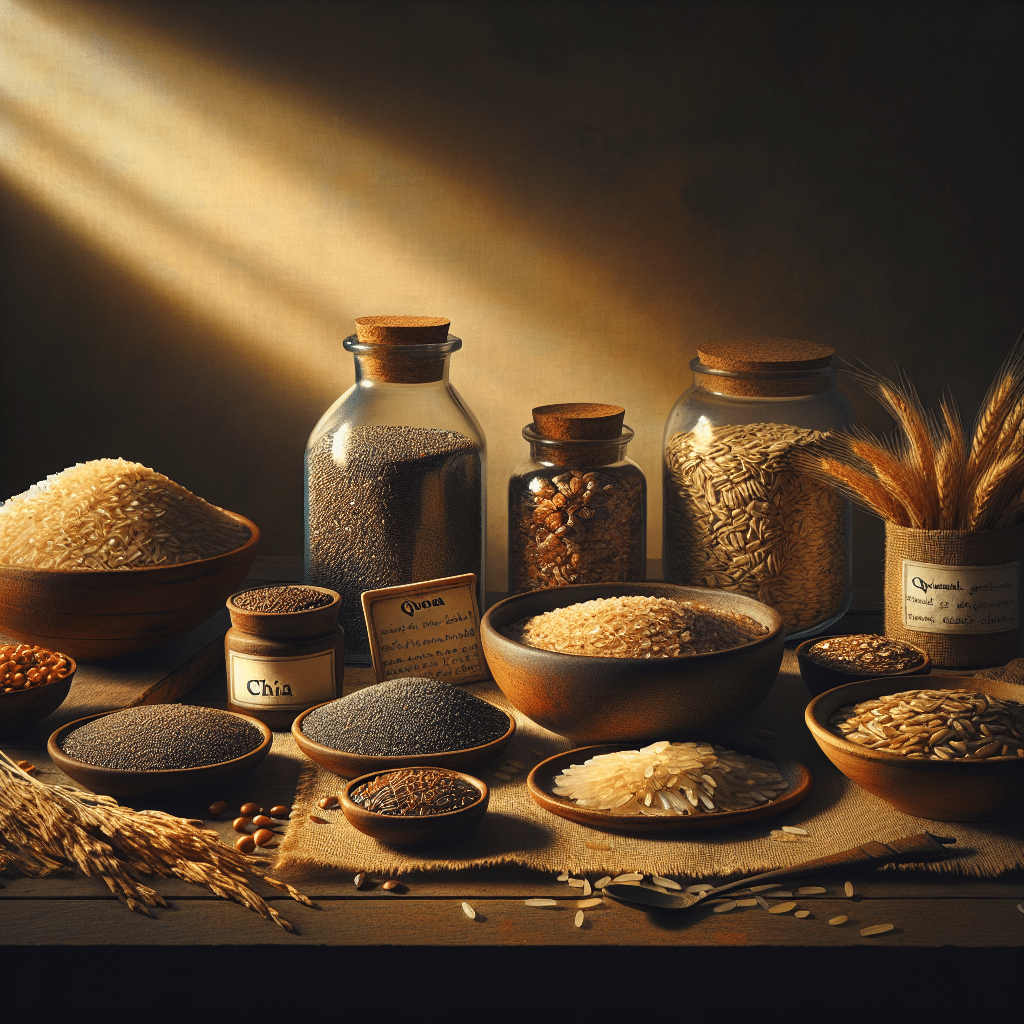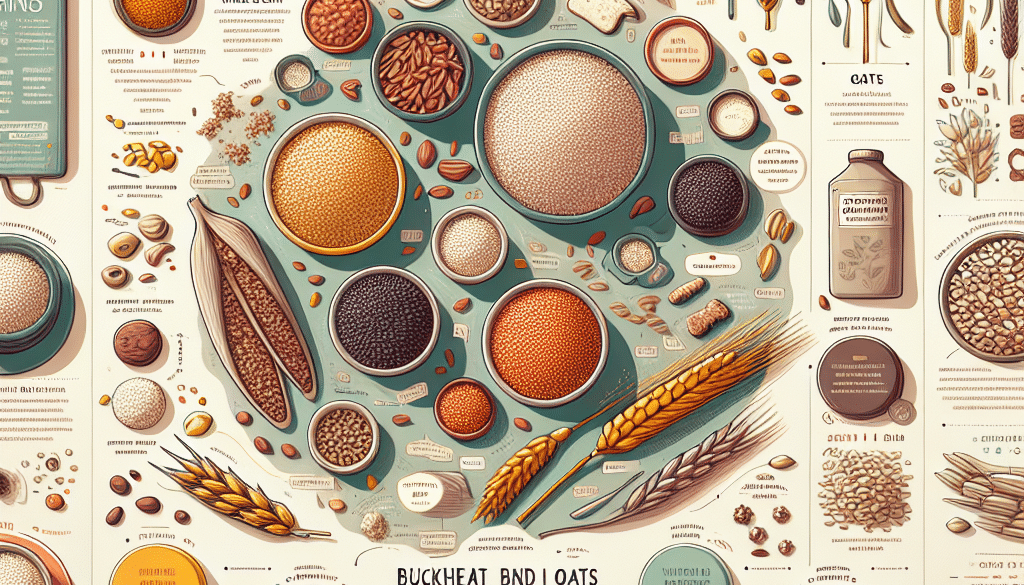Whole Grains At-A-Glance
-
Table of Contents
- Whole Grains 101: Essential Guide to Nutritious Cereals
- Understanding Whole Grains
- Health Benefits of Whole Grains
- Types of Whole Grains
- Incorporating Whole Grains into Your Diet
- Whole Grains and Gluten Sensitivity
- Conclusion: Embracing Whole Grains for Better Health
- Enhance Your Diet with ETChem’s Protein Products
Whole Grains 101: Essential Guide to Nutritious Cereals

Whole grains have been a fundamental part of the human diet for thousands of years. They are not only a source of essential nutrients but also have been linked to a lower risk of several chronic diseases. This comprehensive guide will delve into the world of whole grains, exploring their health benefits, types, and how to incorporate them into your daily diet.
Understanding Whole Grains
Whole grains are the seeds of grass-like plants called cereals. They consist of three key parts: the bran, the germ, and the endosperm. Unlike refined grains, which have been processed to remove the bran and germ, whole grains include all three components, each contributing its unique nutritional properties.
- The Bran: This is the outer layer that provides fiber, antioxidants, and B vitamins.
- The Germ: It is the core of the seed where growth occurs, rich in nutrients like vitamin E, B vitamins, and healthy fats.
- The Endosperm: This is the largest part of the grain, providing carbohydrates and protein, along with some vitamins and minerals.
Health Benefits of Whole Grains
Consuming whole grains as part of a healthy diet can offer numerous health benefits:
- Reduced Risk of Heart Disease: Studies have shown that whole grains can lower the risk of heart disease by reducing blood pressure and cholesterol levels.
- Better Weight Management: The fiber content in whole grains can help you feel full longer, which can prevent overeating and contribute to weight loss.
- Lower Risk of Type 2 Diabetes: Whole grains can improve blood sugar control, which may reduce the risk of developing type 2 diabetes.
- Improved Digestive Health: The fiber in whole grains helps maintain bowel health and regularity.
- Reduced Inflammation: Some studies suggest that whole grains can reduce inflammation, which is linked to many chronic diseases.
Types of Whole Grains
There is a wide variety of whole grains available, each with its unique taste and nutritional profile. Here are some common types:
- Wheat: Includes varieties like spelt, emmer, einkorn, and Kamut.
- Rice: Brown rice, wild rice, and black rice are whole grain options.
- Oats: Often eaten as oatmeal or rolled oats.
- Barley: Look for hulled or dehulled barley, as pearl barley is not a whole grain.
- Corn: Whole cornmeal and popcorn are whole grain forms of corn.
- Rye: Whole rye and pumpernickel are whole grain varieties.
- Millet: A small, round grain that is naturally gluten-free.
- Quinoa: Though technically a seed, quinoa is classified as a whole grain and is also gluten-free.
Incorporating Whole Grains into Your Diet
Adding whole grains to your diet can be simple and delicious. Here are some tips:
- Start your day with a bowl of oatmeal or whole grain cereal.
- Use whole grain bread for sandwiches and toast.
- Substitute brown rice or quinoa for white rice in recipes.
- Add barley to soups and stews for extra texture and nutrition.
- Enjoy popcorn as a whole grain snack, but be mindful of added butter and salt.
- Experiment with less common grains like farro, bulgur, or freekeh.
Whole Grains and Gluten Sensitivity
For individuals with celiac disease or gluten sensitivity, it’s important to choose grains that are gluten-free. Safe options include rice, corn, quinoa, millet, and gluten-free oats. Always check labels to ensure the products are certified gluten-free.
Conclusion: Embracing Whole Grains for Better Health
Whole grains are a nutritious and versatile component of a balanced diet. By understanding their health benefits and learning how to incorporate a variety of whole grains into your meals, you can take significant steps towards improving your overall health. Remember to aim for at least half of your grains to be whole grains, as recommended by dietary guidelines.
Enhance Your Diet with ETChem’s Protein Products
If you’re looking to complement your intake of whole grains with high-quality protein products, ETChem offers a range of collagen-based options. Their products are perfect for those seeking to support their health and wellness goals. Whether you’re interested in sports nutrition, weight management, or general dietary supplements, ETChem has a solution to meet your needs.
About ETChem:
ETChem, a reputable Chinese Collagen factory manufacturer and supplier, is renowned for producing, stocking, exporting, and delivering the highest quality collagens. They include marine collagen, fish collagen, bovine collagen, chicken collagen, type I collagen, type II collagen and type III collagen etc. Their offerings, characterized by a neutral taste, instant solubility attributes, cater to a diverse range of industries. They serve nutraceutical, pharmaceutical, cosmeceutical, veterinary, as well as food and beverage finished product distributors, traders, and manufacturers across Europe, USA, Canada, Australia, Thailand, Japan, Korea, Brazil, and Chile, among others.
ETChem specialization includes exporting and delivering tailor-made collagen powder and finished collagen nutritional supplements. Their extensive product range covers sectors like Food and Beverage, Sports Nutrition, Weight Management, Dietary Supplements, Health and Wellness Products, ensuring comprehensive solutions to meet all your protein needs.
As a trusted company by leading global food and beverage brands and Fortune 500 companies, ETChem reinforces China’s reputation in the global arena. For more information or to sample their products, please contact them and email karen(at)et-chem.com today.




